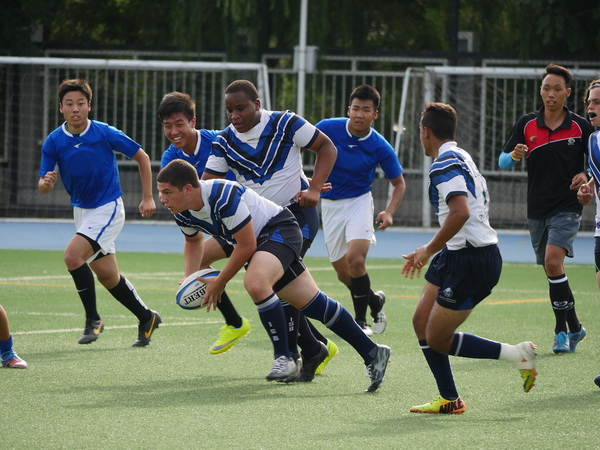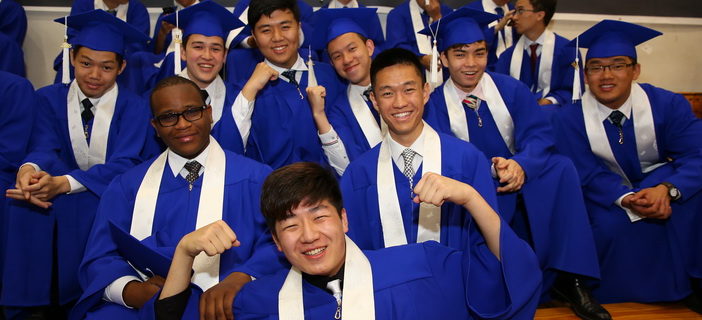In the digital age, a cursory online search about “college admission myths” can generate millions of results – and just as many as concerns. The overwhelming amount of contradictory information can leave many parents and students with more questions than answers in their quest for sound advice from trustworthy sources.
In its Guide for Families in the College Admission Process, the National Association for College Admission Counseling suggests parents and guardians’ first steps towards planning for college should begin when their child is in middle school (grades 6-8). This might seem early, but during a sit down with the International School of Beijing‘s (ISB) High School Counseling Team Leader, Andy Mennick, we learned that many US college admission offices scrutinize students’ entire high school transcripts – and not just senior year results.

High School Counseling Team Leader, Andy Mennick
The most fundamental part of the college application process is finding the “best-fit” school. Is an Ivy League university the best choice? Not necessarily. Amid the flow of abundant information, high school counselors play a crucial role in helping students and parents navigate this important process with confidence. Mennick, who has over 20 years’ experience as a high school counselor, shares with us five common misconceptions about college applications:

1) Scores are Everything
The world has evolved from the “third industrial revolution” style of education, where standardized tests alone determined which university a student was accepted into. The Chinese education system still puts great emphasis on passing final exams, such as the gaokao. However, getting higher SAT and/or ACT scores aren’t an automatic guarantee of college acceptance in other countries. This is one of the most common misconceptions because college admissions officers ask for transcripts to see what the students have been doing throughout their high school life. Pay closer attention to the subjects and activities students are involved in.
2) External College Consulting Companies can Provide a Quick-fix
Unless your child’s school does not have a dedicated counseling team, this is not the time to get outside help. Private consulting companies charge a lot of money with the promise they can offer students a place at their “dream” school. The process of college counseling is a personal one. It requires getting one-on-one time, getting to know students intimately, and helping them navigate their lives as they get ready for the future. It isn’t a quick-fix process; it requires time and attention – something most private companies don’t invest in.

3) The Author of a Recommendation Letter is More Important than the Content
The golden rule for recommendation letters? No name dropping! A famous or influential family friend who seldom sees your child can’t write a recommendation letter that is as convincing as one written by a teacher. In the special circumstances where a student has outside help, such as from a coach, they should be listed as one of the referees. The people who are directly involved with your child’s education and are familiar with your child’s strengths and character are best positioned to write a recommendation letter. College admission officers want to hear from teachers who know what kind of learner (and individual) your child is.
4) There’s a ‘Magic’ Formula
The college admissions process is a personalized experience. One student’s pathway into college might not be suited to another. More accurately, the journeys students navigate into college are as diverse as they are. Your child is unique with their own interests, passions, and ambitions. Take these into account and don’t feel pressured to follow the lead of others.
5) University Rankings Matter
A 2012 survey of employers from different industries shed light on how they make decisions when hiring college graduates. Data from the Chronicle of Higher Education shows that most employers placed college reputation as the least relevant attribute. University rankings are deceiving because they don’t really tell students about the university’s culture. Moreover, some rankings are based on graduate research programs (not undergraduate courses), which provides a misleading picture.

Education is ever-evolving and trends are constantly changing. However, by dispelling some myths about college admissions you can make informed decisions grounded in research and expertise. ISB will be hosting an information session on college admissions led by Mennick on March 22 for grade 8-11 parents and students. This event is a good opportunity to get informed and ask questions unique to your family’s situation as you search for a “best-fit” university.
College Guidance Best Practices from ISB
Wednesday, March 22 from 9–11am
Space is limited. Long-press/Scan the QR code or visit www.isb.bj.edu.cn to register

![]() This blog is sponsored by ISB
This blog is sponsored by ISB
Photos: ISB




